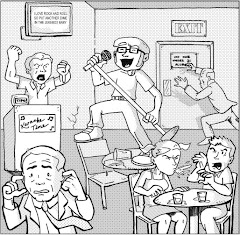
When I saw the cover to Justice League of America #173, I knew the issue would be the perfect send off to Black History Month. Consider this image’s implications, before even cracking the comic open: Black Lightning refuses to join the team based on the impression of the no-name “jive bunch of turkeys” behind Superman. Would Black Lightning really refuse the Justice League based on the awkward physical appearance of other heroes? Is Black Lightning really judging the proverbial book by its cover -- leading me to do so, as well? Further, one has to wonder, did black people really talk like that back in 1979? Themes of discrimination and stereotyping abound, and we haven’t even read the story yet.
Fortunately, though the issue’s plot goes in a slightly different direction than its cover implies, Justice League of America #173 is a tale about testing one’s character, which is just as integral to Black History Month. When Green Arrow recommends Black Lightning for JLA membership, the Flash misunderstands his motives, saying, “I never thought you would suggest we take in a token black . . .” The accusation sparks a heated debate that results in the decision to test Lightning’s mettle -- through fisticuffs. The League disguises their identities (as the weirdoes on the cover) and attacks the unsuspecting hero quite mercilessly, and though Black Lightning defeats Green Lantern and Zatanna’s villainous alter egos, the Flash’s speed overwhelms him. Enraged, Lightning almost chokes out Green Arrow, and when the League reveals their motives, he declines their offer. “You just better get yourself another boy!” he retorts. Though his statement is dismissed, its undertone brings the racial theme full circle.
I’m grateful writer Gerry Conway didn’t pull any punches with his dialogue in this issue. Although Flash’s rash judgment is chalked up to grief over his wife’s recent death, Green Arrow’s reputation as “Mister Liberal” (Barry’s words!) does dictate many of his decisions and the heroes were right to examine the context of the recruitment. That even the world’s greatest superheroes have to deal with social impressions and implications is a refreshing take on their roles as public figures, in 1979 and now thirty years later.* Could you imagine a super-team of exclusively white heroes in the crosshairs of today’s media? Would their recruitment of a hero like Black Lightning be hailed as historical, or outdated obligation? I wonder how the rest of the world hails our inauguration of a black President, considering other countries' acceptance of minorities in leadership.

Of course, the elephant in the room is Black Lightning's name, as his superhero alias purely denotes his skin color and nothing more. Surely a character created nowadays wouldn't face a potentially demeaning moniker like this, yet Lightning's character has transcended that distinction and become timeless in both his name and role as a representative of his race in the DC Universe.
To that end, interestingly, a brief subplot about the impending Metropolis Vigilante Act raises questions about Conway’s mentality behind mentioning it. When a detective warns Black Lightning that his antics might attract political and legal attention, the hero replies, “Any law that’s gonna affect this boy’ll also hafta affect Superman . . . and no way is that gonna happen in this town.” The statement seems true enough in the DC Universe, where Superman could do no wrong, but was Conway establishing an allegory for the contradictory judgments of society, as well? Was he trying to combat social injustice and assert that the law of the land is applicable to anyone, despite racial stereotypes that certain youth are more prone to criminal activity?
Although Black Lightning’s dialogue is definitely dated (if even accurate to the vernacular of the time, rife with words like “jive” and slang contractions like “hafta”), his integrity as a hero is unquestionable. Although his electric powers are offensive in nature, he primarily uses them defensively and takes down his opponents hard and quickly, an interesting contrast to the League’s preference to just jump right in and throw punches -- even against a fellow good guy, even as just a test! The world’s greatest superheroes come off as the world’s most arrogant, too, in their assumption that Lightning would embrace their offer. I’d say this hero passed the test, staying true to his passions rather than succumbing to the temptations of celebrity.
I wish they still made comics like this. First of all, while it wasn’t critical to my review, I’d be remiss not to at least mention that artists Dick Dillin and Frank McLaughlin deliver amazing, engaging work here. Further, although your typical super-villain schemes in the background, setting up the next issue, this issue surely stands on its own, offering real characterization, fun action, and a few poignant questions about real life. Judging Justice League of America #173 based solely on its cover doesn’t do it justice.
* This issue was released in December 1979, the month and year of my birth. It would be interesting to track down all of the comics published that month, to understand what was happening in my beloved medium as I was entering the world. Hmm . . .
Justice League of America #173 was published by DC Comics and was written by Gerry Conway, illustrated by Dick Dillon and Frank McLaughlin, lettered by Ben Oda, and colored by Jerry Serpe.



No comments:
Post a Comment